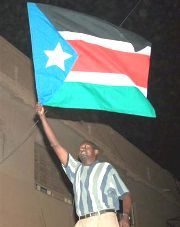Sudan opposition parties urge inclusion for peace
By Opheera McDoom
KHARTOUM, Jan 9 (Reuters) – Sudan’s peace deal to end civil war in its south may be welcome to its war-weary people, but opposition parties say the accord will need a wider support base to ensure long-term success in the huge and diverse country.
 Sudan’s government, dominated by the ruling National Congress (NC) party, signed a peace deal with the southern rebel Sudan People’s Liberation Movement (SPLM) on Sunday, but observers say the agreement needs to be inclusive of other political parties with huge popular followings for peace to last.
Sudan’s government, dominated by the ruling National Congress (NC) party, signed a peace deal with the southern rebel Sudan People’s Liberation Movement (SPLM) on Sunday, but observers say the agreement needs to be inclusive of other political parties with huge popular followings for peace to last.
The two mainstream northern political parties, the Democratic Unionist Party (DUP) and the Umma party, dominated politics during Sudan’s brief experiments with democracy. Both welcome the deal to end over two decades of war in the south.
The DUP reopened its office in Khartoum on Friday, after years of opposition in exile to the NC government, which overthrew Sudan’s democratically elected government in a bloodless coup in 1989.
“We have to work together to make peace work,” said Elbagir Ahmed Abdallah, a member of the DUP’s executive. He said the DUP would cooperate with the transitional government, which will be dominated by the two warring parties until elections are held within four and a half years.
Under the deal, the National Congress will take 52 percent of parliament, with the SPLM controlling 28 percent of seats. Other northern parties will have 14 percent and other southern parties six percent of the national assembly.
“The people of Sudan – southerners particularly – want this peace, with all its limitations,” said John Ryle of the Rift Valley Institute. “The limitations are primarily the fact that it is an agreement between two autocratic armed groups.”
The Umma party, led by the popular Sadeq al-Mahdi, whose family has dominated Sudanese politics since independence from Britain in 1956, said it would not join the transitional government unless a national conference was held to include all political factions.
“The National Congress is the only party in Sudan which is opposed to holding an all-party national conference,” Umma Party Secretary-General Abdel Nabie Ali Ahmed told Reuters. “Without this we will not join the transitional government,” he said.
THORN IN SIDE
Possibly the sharpest thorn in Khartoum’s side is President Omar Hassan al-Bashir’s former ally, wily Islamist politician Hassan al-Turabi, jailed last year without charge amid accusations he incited tribal tensions in Sudan’s western Darfur region, where a rebellion has raged for almost two years.
Many believe he will be released after a peace deal, when emergency law will be lifted in most, if not all, of the country. But his Popular Congress party was suspended early last year after the government accused it of involvement in three coup attempts. Khartoum also says one of Darfur’s two main rebel groups is the armed wing of the Popular Congress.
The party will not join the transitional government, but plans to concentrate its efforts on winning popular support at future elections.
The southern deal, to end a 21-year war that has killed some two million people, does not cover the Darfur conflict, which has uprooted almost two million and killed tens of thousands.
Darfur peace talks ground to a halt at the end of last year, but rebels have indicated they will be happier to negotiate with a government which includes the SPLM leader John Garang, who understands their cause – sharing some of the non-Arab rebel gripes with Khartoum over neglect and marginalisation.
“Garang is very positive,” Darfur rebel Sudan Liberation Army (SLA) leader Minni Arcua Minnawi said. “Definitely we will be happier with the government when he becomes part of it.”
SOUTHERN OPPOSITION
But Garang may be kept busy keeping control in the south.
Rumours that his deputy Salva Kiir Mayardit was planning a revolt because he was unhappy with parts of the deal were stoked by his absence at the signing of the final protocols on Dec. 31.
However Salva Kiir appeared alongside Garang at a news conference in Nairobi on Saturday, and Garang told the reporters the two men had no differences. Salva Kiir did not speak.
Former southern rebel commander and ex-vice president, Joseph Lagu, has expressed his readiness to return to arms if the SPLM did not embrace all factions in the south.
“I am fit and ready to return to the battlefield at any moment,” he told reporters in Khartoum. “There are more people against Garang in the south than there are with him.”
Some southerners resent the dominance of the SPLM by the Dinka tribe, the most populous in the mainly Christian and animist south, despite the inclusion of Muslim and non-Dinka leaders such as Yasir Arman and Riak Machar.
Machar, of the southern Nuer tribe, led a coup against Garang in the early 1990s and joined the government, before fleeing Khartoum in 2000 and rejoining the ranks of the SPLM.
“It will not be easy – getting the deal was the easy part,” said one senior Western diplomat in Khartoum. “Now they will really have to work hard at keeping this country together.”
